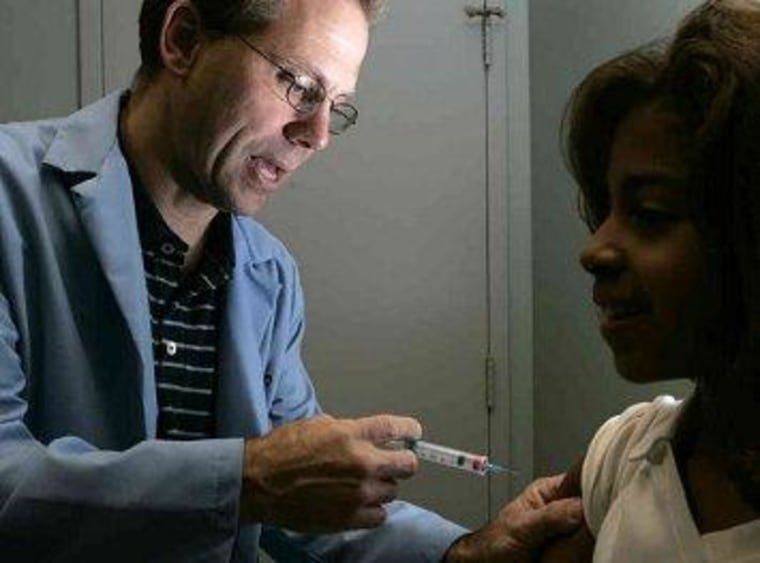Katy Waldman asked an important question about public health the other day, which deserves a substantive answer: "Why aren't more teenage girls getting vaccinated against the human papillomavirus (HPV)?"
The New York Times reported last week that vaccination rates for the disease, which is the most common sexually transmitted infection and "a principal cause of cervical cancer," failed to improve from 2011 to 2012. This despite the fact that the rates at which people get "new vaccines typically increase by about 10 percentage points a year," according to Dr. Thomas R. Frieden, director of the Centers for Disease Control and Prevention.And despite that experts have recommended since 2007 that girls receive the triptych of shots at age 11 or 12. Every year, HPV causes about 19,000 cancers in women (mostly cervical) and close to 8,000 cancers in men (mostly throat). Yet, says the Times, "only 33 percent of teenage girls finished the required three doses of the vaccine in 2012 ... putting the United States close to the bottom of developed countries in coverage."
Without more information, we can't say with confidence exactly why more girls aren't getting the HPV vaccine, but the fear is that politics is influencing the public-health campaign.
For those looking for a refresher, there's been an FDA-approved vaccine available for several years that immunizes against HPV infection, but as the Republican Party has become more radicalized, the vaccine has been caught up in a culture war -- many conservatives believe the vaccine encourages minors to have sex, and if they do have sex, they apparently should be punished with cancer.
The politics surrounding the HPV vaccine took a turn towards the ridiculous in 2011, when Rep. Michele Bachmann (R-Minn.), at the time an almost-credible presidential candidate, went after Texas Gov. Rick Perry (R) for giving the vaccine to girls in his state. The right-wing lawmaker claimed that the HPV vaccine can lead to mental retardation -- a claim with no foundation in reality -- and Perry ended up apologizing for one of his only progressive acts in office.
It became a hot-button issue again last year when South Carolina Gov. Nikki Haley (R) vetoed an HPV bill approved by state lawmaker in her own party, despite pleas from state health officials. (South Carolina ranks ninth nationwide for cervical cancer deaths. This, alas, did not sway the governor.)
As is often the case, science keeps getting in the way of far-right Republican talking points. Last fall, research helped document the fact that the HPV vaccine did not change sexual behavior among minors, and in June, new data published in the Journal of Infectious Diseases helped document the extent to which the vaccine is literally a life-saver.
Here's hoping the recent trend in vaccination rates improves soon.
